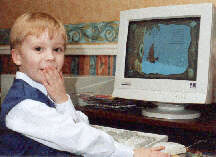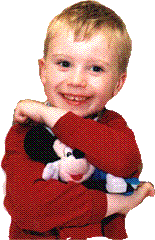|
Oliver Oliver was officially diagnosed as a child with autism shortly after his 4th birthday. As parents we had concerns about his development from the age of two years. At this time health workers felt that Oliver was shy and would soon learn how to talk and socialise as contact grew with other children at nursery (Oliver is our only child and we have no relatives with young children in our area). We encouraged Oliver to mix with other children before starting nursery education by attending pre-school gymnastics club and mothers & toddlers groups. However, Oliver tended to shy away form the other children and played near rather than with them. Whenever a child approached, Oliver would run away. Nursery school was a traumatic experience for him - Oliver would not stay at nursery without mum in sight and did not want to or know how to join in the activities. With the full support of the Oliverís school, he was referred to the Education Department for assessment and a Statement of Special Educational Needs was issued within 9 months. Oliver currently has the full-time support of a SNA (Special Needs Assistant) in the classroom and a Lunchtime Supervisor. Oliver attends our local mainstream school. On hindsight Oliver may have benefited from early referral but we do not feel that the earlier advice given to us by health workers was unreasonable given that at the time in question Oliver did not appear so significantly behind in social/communication skills. We feel that in Oliverís case early diagnosis may have proved difficult. Oliver at 5 years We believe Oliver to be a reasonably high functioning autistic child. He is verbal and has an extensive vocabulary of nouns. He uses 'sentences' of 4 to 5 words. He does not initiate conversation but he can learn set responses to set questions. He is beginning to communicate his needs verbally - for example "drink please," "something to eat," "want some help." Other needs are obtained by his plea "can I have a...?" - here it is up to us to give him a list of possibilities until we 'hit' upon the right thing which he will confirm by repeating our suggested word. He still has his habit of repeating a word over and over again until we say his word too. He can read words mechanically but we are unsure of how much he understands. Click 'here' to listen to Oliver 'reading' (6th August, 1997). At home Oliver is a very happy and jolly boy. He is increasingly wanting our company both in his and our own activities. We have noticed that eye contact is increasing too. He is beginning to develop a sense of humour. Oliver will say things wrong on purpose and laugh out loud. He will watch and laugh in the 'appropriate places' at Tom and Jerry cartoons. He no longer cries or screams when he encounters strangers, he will smile and look embarrassed or sometimes say "hello." Oliver is just starting to be able to be left with his paternal grandparents for a few hours without becoming anxious or upset. He still remains generally oblivious to other children but he tolerates their company and allows them to assist him in work or play. Oliver is displaying a curiosity of our world. He asks questions such as "where we going now?", "how do you spell?" and "that's a?" (which is Oliver's way of asking 'what is this?'). Oliver still insists on his cars, flash cards, books etc. being in long straight lines, precisely placed and will repeat simple actions ad infinitum. His video cassette currently on constant play and rewind is Disney's Sing-a-Long Songs Pongo and Perdita. He has worn out numerous video cassettes and VCRs! We can tell when Oliver is tired because this is when he displays his autistic behaviours of rocking from front to back foot and wringing his hands. He will also 'twiddle' feel the seams of his top or trousers. What Oliver Likes And Enjoys Oliver loves singing and is always vocalising to music. Of course many of his words are unrecognisable and his melody line and rhythm are approximate but the speed and metre is very accurate. We believe Oliver has a good memory and a very clear 'recording' in his mind of the music he recalls. Oliver enjoys action songs and copies simple movements. He also likes to dance to all kinds of music. He will jump, skip, hop and clap along to the music. He sometimes copies song and dance routines from children's videos (for example the musical numbers from Chitty Chitty Bang Bang). Oliver was fascinated by American Line Dancing on holiday and wanted to join in, he attempted to imitate some steps and actions. Oliver loves using the computer. We first encouraged him to use the computer by holding his arm or hand to reassure him while pressing the enter key or space bar. Oliver enjoyed the response the computer made but he hated it if he gave the 'wrong' answer which made the computer sound a 'scary' noise. Oliver was fascinated by the fact that he could make things happen. These programs were in the Europress Funschool series. In a closing down sale we came across pre-school programs based on the Nintendo Mario game. 'Mario's Playschool' introduces concepts such as shape, colour, numbers and household sounds. With support, Oliver began to use the mouse. These programs are very child friendly - there are no 'scary' sounds if the wrong answer is selected - it simply tells you what has been chosen and reminds you again what you need to be looking for. Even though Oliver was already familiar with the concept of numbers and colours these programs were still very useful in consolidating his understanding and building his confidence in using the computer. He will still play happily with Mario games even though he finds them very easy.  Oliver thoroughly enjoys using the computer Oliver thoroughly enjoys using the computerOliver is now at ease with the computer and accepts new programs without fuss. Previously anything new was approached with great fear by him. He gets a lot of enjoyment from the Disney Interactive Storybooks - he explores the screens freely looking for hot spots. Oliver is happy to choose what page or activity to visit. Before Oliver used the computer he found great difficulty in making choices of any kind. We now encourage him to read along with the story books and then to read / repeat aloud the text himself. This is extending his sight vocabulary. Oliver also enjoys exploring 'Knowledge Adventure - Jump Ahead Year 1' and the BBC interactive CDs 'Noddy' and 'Pingu' (although we don't rate 'Pingu' too highly as a model of good language!). Oliver will now even select the 'wrong' answer on purpose in order to get an appropriate response. The multimedia application in 'Maxis - Marty & The Trouble With Cheese' requires the user to shout out words and commands into a microphone in the appropriate places. Oliver watched us do this for a few times and then joined in once he knew what he needed to say (jump, turn, now). Oliver is quite happy to browse through 'Multipedia' and 'Compton's World Atlas' and displays the typical autistic traits of continuous repetition - visiting certain pages (like steel bands, bacteria and reproduction). He remembers a lot of the facts and regurgitates them in embarrassing situations! He is forever playing a particular sound file (currently 'Silver Bells'). Oliver can choose a disc for himself, insert into the disc drive and boot up from the start menu or hard disc prompt. He now uses the mouse with great speed and accuracy. Oliver will type single words on the qwerty keyboard if prompted to and can print out his 'work.' At present we are experimenting with using pictures, characters and vocabulary from his school reading scheme in the hope that he will begin to construct his own simple sentences. We feel that the computer has been the most significant tool in enhancing Oliver's learning and concentration. The computer is Oliver's favourite pastime and it is rewarding to see him enjoying something so much. |
